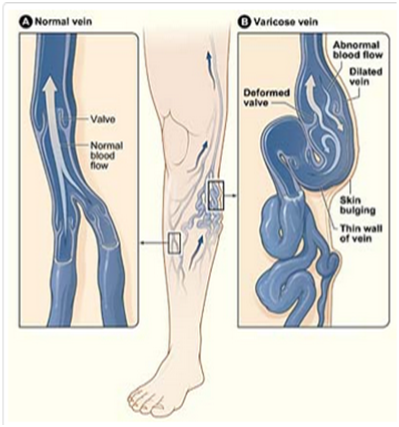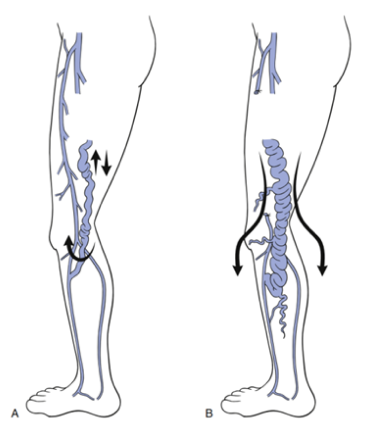Varicose Veins
Home > Varicose Veins
Varicose Veins
Varicose veins are swollen, twisted veins that often appear just beneath the skin’s surface, mostly in the legs. They occur when the valves in the veins become damaged or weakened, leading to blood pooling and vein enlargement. Common symptoms include aching, heaviness, and discomfort, especially after prolonged standing or sitting. While varicose veins are often considered a cosmetic issue, they can lead to more serious complications if left untreated.


Causes of Varicose Veins
Weak or Damaged Valves
Veins contain one-way valves that help blood flow toward the heart. When these valves fail, blood can flow backward and pool in the veins.
Increased Pressure
Factors such as age, pregnancy, obesity, and prolonged standing or sitting can increase pressure in the veins, contributing to the development of varicose veins. Professions such as Teachers, Chefs, Security guards, Surgeons, House wives are commonly affected.
Genetics
A family history of varicose veins can increase the chances of developing the condition.
Symptoms
Visible Veins
Enlarged, twisted veins that are often blue or dark purple.
Pain and Discomfort
Aching, heaviness, or a burning sensation in the legs, especially after prolonged periods of standing or sitting.
Skin Changes
Color changes in the skin, swelling, and the development of sores or ulcers in severe cases.
Diagnosis
Physical Examination
A healthcare provider will assess the legs for swelling, skin changes, and visible varicose veins.
Imaging Tests
Duplex ultrasound (venous doppler) may be used to evaluate blood flow, evaluate which vein is affected and status of deep veins.
Treatment Options
Commonly used thermal ablation techniques employed are Endovenous Laser Ablation (EVLA) and Radiofrequency ablation (RFA). Non thermal varicose treattment includes VenaSeal. It is a specialised adhesive that seals the vein when injected into them without using heat.
Self-Care Measures
Elevating the legs, exercising regularly, and wearing compression stockings can help alleviate symptoms and prevent worsening of the condition.
Minimally Invasive Procedures
Options include Sclerotherapy (injection of a solution to close the vein),Thermal ablation (using focussed forms of heat to close the vein), and phlebectomy (removal of the vein through small incisions), non thermal treatment of Varicose veins. There is also option for (open) surgical procedure.
Prevention
Maintain a Healthy Weight
Reducing excess weight can decrease pressure on the veins.
Stay Active
Regular exercise promotes good circulation and vein health.
Avoid Sitting or Standing
Take breaks to move around and elevate the legs when sitting.